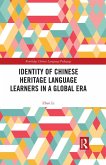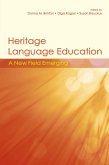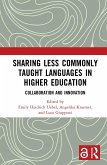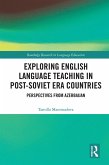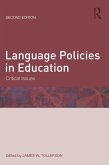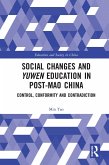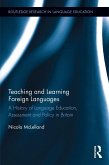Zhen Li
Identity of Chinese Heritage Language Learners in a Global Era (eBook, ePUB)
42,95 €
42,95 €
inkl. MwSt.
Sofort per Download lieferbar

21 °P sammeln
42,95 €
Als Download kaufen

42,95 €
inkl. MwSt.
Sofort per Download lieferbar

21 °P sammeln
Jetzt verschenken
Alle Infos zum eBook verschenken
42,95 €
inkl. MwSt.
Sofort per Download lieferbar
Alle Infos zum eBook verschenken

21 °P sammeln
Zhen Li
Identity of Chinese Heritage Language Learners in a Global Era (eBook, ePUB)
- Format: ePub
- Merkliste
- Auf die Merkliste
- Bewerten Bewerten
- Teilen
- Produkt teilen
- Produkterinnerung
- Produkterinnerung

Bitte loggen Sie sich zunächst in Ihr Kundenkonto ein oder registrieren Sie sich bei
bücher.de, um das eBook-Abo tolino select nutzen zu können.
Hier können Sie sich einloggen
Hier können Sie sich einloggen
Sie sind bereits eingeloggt. Klicken Sie auf 2. tolino select Abo, um fortzufahren.

Bitte loggen Sie sich zunächst in Ihr Kundenkonto ein oder registrieren Sie sich bei bücher.de, um das eBook-Abo tolino select nutzen zu können.
Identity of Chinese Heritage Language Learners in a Global Era enriches the current research on heritage language (HL) learner identity by examining how identity is constructed, negotiated and performed in the narratives of university Chinese HL (CHL) learners in Hong Kong.
- Geräte: eReader
- mit Kopierschutz
- eBook Hilfe
Andere Kunden interessierten sich auch für
![Identity of Chinese Heritage Language Learners in a Global Era (eBook, PDF) Identity of Chinese Heritage Language Learners in a Global Era (eBook, PDF)]() Zhen LiIdentity of Chinese Heritage Language Learners in a Global Era (eBook, PDF)42,95 €
Zhen LiIdentity of Chinese Heritage Language Learners in a Global Era (eBook, PDF)42,95 €![Heritage Language Education (eBook, ePUB) Heritage Language Education (eBook, ePUB)]() Heritage Language Education (eBook, ePUB)60,95 €
Heritage Language Education (eBook, ePUB)60,95 €![Sharing Less Commonly Taught Languages in Higher Education (eBook, ePUB) Sharing Less Commonly Taught Languages in Higher Education (eBook, ePUB)]() Sharing Less Commonly Taught Languages in Higher Education (eBook, ePUB)0,00 €
Sharing Less Commonly Taught Languages in Higher Education (eBook, ePUB)0,00 €![Exploring English Language Teaching in Post-Soviet Era Countries (eBook, ePUB) Exploring English Language Teaching in Post-Soviet Era Countries (eBook, ePUB)]() Tamilla MammadovaExploring English Language Teaching in Post-Soviet Era Countries (eBook, ePUB)40,95 €
Tamilla MammadovaExploring English Language Teaching in Post-Soviet Era Countries (eBook, ePUB)40,95 €![Language Policies in Education (eBook, ePUB) Language Policies in Education (eBook, ePUB)]() Language Policies in Education (eBook, ePUB)62,95 €
Language Policies in Education (eBook, ePUB)62,95 €![Social Changes and Yuwen Education in Post-Mao China (eBook, ePUB) Social Changes and Yuwen Education in Post-Mao China (eBook, ePUB)]() Min TaoSocial Changes and Yuwen Education in Post-Mao China (eBook, ePUB)40,95 €
Min TaoSocial Changes and Yuwen Education in Post-Mao China (eBook, ePUB)40,95 €![Teaching and Learning Foreign Languages (eBook, ePUB) Teaching and Learning Foreign Languages (eBook, ePUB)]() Nicola MclellandTeaching and Learning Foreign Languages (eBook, ePUB)45,95 €
Nicola MclellandTeaching and Learning Foreign Languages (eBook, ePUB)45,95 €-
-
-
Identity of Chinese Heritage Language Learners in a Global Era enriches the current research on heritage language (HL) learner identity by examining how identity is constructed, negotiated and performed in the narratives of university Chinese HL (CHL) learners in Hong Kong.
Dieser Download kann aus rechtlichen Gründen nur mit Rechnungsadresse in A, B, BG, CY, CZ, D, DK, EW, E, FIN, F, GR, HR, H, IRL, I, LT, L, LR, M, NL, PL, P, R, S, SLO, SK ausgeliefert werden.
Produktdetails
- Produktdetails
- Verlag: Taylor & Francis eBooks
- Seitenzahl: 176
- Erscheinungstermin: 30. September 2022
- Englisch
- ISBN-13: 9781351809818
- Artikelnr.: 65710999
- Verlag: Taylor & Francis eBooks
- Seitenzahl: 176
- Erscheinungstermin: 30. September 2022
- Englisch
- ISBN-13: 9781351809818
- Artikelnr.: 65710999
- Herstellerkennzeichnung Die Herstellerinformationen sind derzeit nicht verfügbar.
Zhen Li is currently Assistant Professor at the Education University of Hong Kong. She taught Chinese as a second language to students from multicultural and multilingual backgrounds in Hong Kong for nearly ten years. Her research interests include identity in cross-cultural contexts, second language education, teacher development, and intercultural communication.
AUTHOR'S NOTE
List of Tables
List of Figures
1 INTRODUCTION
Heritage Language
Definition of HL Learners
Differences between HL and L2 Learners
Research Background
Chinese as a Heritage Language
CHL Speakers as Learners
Means of CHL Learning
Home Language Maintenance
HL Schools
Mixed CFL Classes
The Sociolinguistic Landscape of Hong Kong
The English Landscape
The Changing Linguistic Landscape
University CHL Students in Hong Kong
Rationale for Research
Research Question and Aims
2 UNDERSTANDING HL LEARNER IDENTITY
The Interactional Sociolinguistic Paradigm
The Sociopsychological Paradigm
The Poststructuralist Perspective
Understanding Identity in Narratives
The Intersection between Identity and Storytelling
The Co-construction of Identity in Narrative Interviews
Positioning Theory
An Integrated Framework for Understanding CHL Learner Identity
3 THE RESEARCH PROJECT
Epistemology
Narrative Inquiry
Establishing Rapport and Reciprocity
The Research Setting and Participants
Data Analysis
Trustworthiness
Ethical Issues
4 IDENTITY IN LANGUAGE LEARNING
The Narrative Events
Learning Experiences at Early Life Stages
Chinese Learning in School-based Contexts
Chinese Supplementary Schools Overseas
CFL Classes in Hong Kong K-12 Schools
Class Adaptation for Transnational Learners
Home Language Learning
Reconstructing Learner Identity
Peer Influence
Asian Pop Culture
Career Benefits and Identity-Related Issues
The University CFL classes
Summary
5 IDENTITY IN LANGUAGE USE
The Narrative Events
Multilingual Practices
Language Practices at Home
Language Socialisation at University
CHL Ideologies and Language Hierarchies
Cantonese and Mandarin
Traditional and Simplified Characters
Summary
6 IDENTITY IN SOCIAL EXPERIENCE
The Narrative Events
Before-and-Now: The Western-versus-Chinese
"I Just Feel More Comfortable with a Chinese"
"Culturally I Understand More Where They Are Coming From"
"They Still Live in the Sixties"
Here-and-Now: Local-versus-International
"Definitely the International"
"Like People from the Similar Backgrounds"
"We Are More Outgoing and We Have More Leadership Skills"
"They Are a Bit Stuck"
Summary
7 CONCLUSIONS
Agency and Investment Change in CHL learning
Language Practices in the Context of Superdiversity
Social Membership and Imagined Communities
Implications of the Study
Further Suggestions
REFERENCES
Appendix A: Interview Guide
Appendix B : Transcription Conventions
List of Tables
List of Figures
1 INTRODUCTION
Heritage Language
Definition of HL Learners
Differences between HL and L2 Learners
Research Background
Chinese as a Heritage Language
CHL Speakers as Learners
Means of CHL Learning
Home Language Maintenance
HL Schools
Mixed CFL Classes
The Sociolinguistic Landscape of Hong Kong
The English Landscape
The Changing Linguistic Landscape
University CHL Students in Hong Kong
Rationale for Research
Research Question and Aims
2 UNDERSTANDING HL LEARNER IDENTITY
The Interactional Sociolinguistic Paradigm
The Sociopsychological Paradigm
The Poststructuralist Perspective
Understanding Identity in Narratives
The Intersection between Identity and Storytelling
The Co-construction of Identity in Narrative Interviews
Positioning Theory
An Integrated Framework for Understanding CHL Learner Identity
3 THE RESEARCH PROJECT
Epistemology
Narrative Inquiry
Establishing Rapport and Reciprocity
The Research Setting and Participants
Data Analysis
Trustworthiness
Ethical Issues
4 IDENTITY IN LANGUAGE LEARNING
The Narrative Events
Learning Experiences at Early Life Stages
Chinese Learning in School-based Contexts
Chinese Supplementary Schools Overseas
CFL Classes in Hong Kong K-12 Schools
Class Adaptation for Transnational Learners
Home Language Learning
Reconstructing Learner Identity
Peer Influence
Asian Pop Culture
Career Benefits and Identity-Related Issues
The University CFL classes
Summary
5 IDENTITY IN LANGUAGE USE
The Narrative Events
Multilingual Practices
Language Practices at Home
Language Socialisation at University
CHL Ideologies and Language Hierarchies
Cantonese and Mandarin
Traditional and Simplified Characters
Summary
6 IDENTITY IN SOCIAL EXPERIENCE
The Narrative Events
Before-and-Now: The Western-versus-Chinese
"I Just Feel More Comfortable with a Chinese"
"Culturally I Understand More Where They Are Coming From"
"They Still Live in the Sixties"
Here-and-Now: Local-versus-International
"Definitely the International"
"Like People from the Similar Backgrounds"
"We Are More Outgoing and We Have More Leadership Skills"
"They Are a Bit Stuck"
Summary
7 CONCLUSIONS
Agency and Investment Change in CHL learning
Language Practices in the Context of Superdiversity
Social Membership and Imagined Communities
Implications of the Study
Further Suggestions
REFERENCES
Appendix A: Interview Guide
Appendix B : Transcription Conventions
AUTHOR'S NOTE
List of Tables
List of Figures
1 INTRODUCTION
Heritage Language
Definition of HL Learners
Differences between HL and L2 Learners
Research Background
Chinese as a Heritage Language
CHL Speakers as Learners
Means of CHL Learning
Home Language Maintenance
HL Schools
Mixed CFL Classes
The Sociolinguistic Landscape of Hong Kong
The English Landscape
The Changing Linguistic Landscape
University CHL Students in Hong Kong
Rationale for Research
Research Question and Aims
2 UNDERSTANDING HL LEARNER IDENTITY
The Interactional Sociolinguistic Paradigm
The Sociopsychological Paradigm
The Poststructuralist Perspective
Understanding Identity in Narratives
The Intersection between Identity and Storytelling
The Co-construction of Identity in Narrative Interviews
Positioning Theory
An Integrated Framework for Understanding CHL Learner Identity
3 THE RESEARCH PROJECT
Epistemology
Narrative Inquiry
Establishing Rapport and Reciprocity
The Research Setting and Participants
Data Analysis
Trustworthiness
Ethical Issues
4 IDENTITY IN LANGUAGE LEARNING
The Narrative Events
Learning Experiences at Early Life Stages
Chinese Learning in School-based Contexts
Chinese Supplementary Schools Overseas
CFL Classes in Hong Kong K-12 Schools
Class Adaptation for Transnational Learners
Home Language Learning
Reconstructing Learner Identity
Peer Influence
Asian Pop Culture
Career Benefits and Identity-Related Issues
The University CFL classes
Summary
5 IDENTITY IN LANGUAGE USE
The Narrative Events
Multilingual Practices
Language Practices at Home
Language Socialisation at University
CHL Ideologies and Language Hierarchies
Cantonese and Mandarin
Traditional and Simplified Characters
Summary
6 IDENTITY IN SOCIAL EXPERIENCE
The Narrative Events
Before-and-Now: The Western-versus-Chinese
"I Just Feel More Comfortable with a Chinese"
"Culturally I Understand More Where They Are Coming From"
"They Still Live in the Sixties"
Here-and-Now: Local-versus-International
"Definitely the International"
"Like People from the Similar Backgrounds"
"We Are More Outgoing and We Have More Leadership Skills"
"They Are a Bit Stuck"
Summary
7 CONCLUSIONS
Agency and Investment Change in CHL learning
Language Practices in the Context of Superdiversity
Social Membership and Imagined Communities
Implications of the Study
Further Suggestions
REFERENCES
Appendix A: Interview Guide
Appendix B : Transcription Conventions
List of Tables
List of Figures
1 INTRODUCTION
Heritage Language
Definition of HL Learners
Differences between HL and L2 Learners
Research Background
Chinese as a Heritage Language
CHL Speakers as Learners
Means of CHL Learning
Home Language Maintenance
HL Schools
Mixed CFL Classes
The Sociolinguistic Landscape of Hong Kong
The English Landscape
The Changing Linguistic Landscape
University CHL Students in Hong Kong
Rationale for Research
Research Question and Aims
2 UNDERSTANDING HL LEARNER IDENTITY
The Interactional Sociolinguistic Paradigm
The Sociopsychological Paradigm
The Poststructuralist Perspective
Understanding Identity in Narratives
The Intersection between Identity and Storytelling
The Co-construction of Identity in Narrative Interviews
Positioning Theory
An Integrated Framework for Understanding CHL Learner Identity
3 THE RESEARCH PROJECT
Epistemology
Narrative Inquiry
Establishing Rapport and Reciprocity
The Research Setting and Participants
Data Analysis
Trustworthiness
Ethical Issues
4 IDENTITY IN LANGUAGE LEARNING
The Narrative Events
Learning Experiences at Early Life Stages
Chinese Learning in School-based Contexts
Chinese Supplementary Schools Overseas
CFL Classes in Hong Kong K-12 Schools
Class Adaptation for Transnational Learners
Home Language Learning
Reconstructing Learner Identity
Peer Influence
Asian Pop Culture
Career Benefits and Identity-Related Issues
The University CFL classes
Summary
5 IDENTITY IN LANGUAGE USE
The Narrative Events
Multilingual Practices
Language Practices at Home
Language Socialisation at University
CHL Ideologies and Language Hierarchies
Cantonese and Mandarin
Traditional and Simplified Characters
Summary
6 IDENTITY IN SOCIAL EXPERIENCE
The Narrative Events
Before-and-Now: The Western-versus-Chinese
"I Just Feel More Comfortable with a Chinese"
"Culturally I Understand More Where They Are Coming From"
"They Still Live in the Sixties"
Here-and-Now: Local-versus-International
"Definitely the International"
"Like People from the Similar Backgrounds"
"We Are More Outgoing and We Have More Leadership Skills"
"They Are a Bit Stuck"
Summary
7 CONCLUSIONS
Agency and Investment Change in CHL learning
Language Practices in the Context of Superdiversity
Social Membership and Imagined Communities
Implications of the Study
Further Suggestions
REFERENCES
Appendix A: Interview Guide
Appendix B : Transcription Conventions

